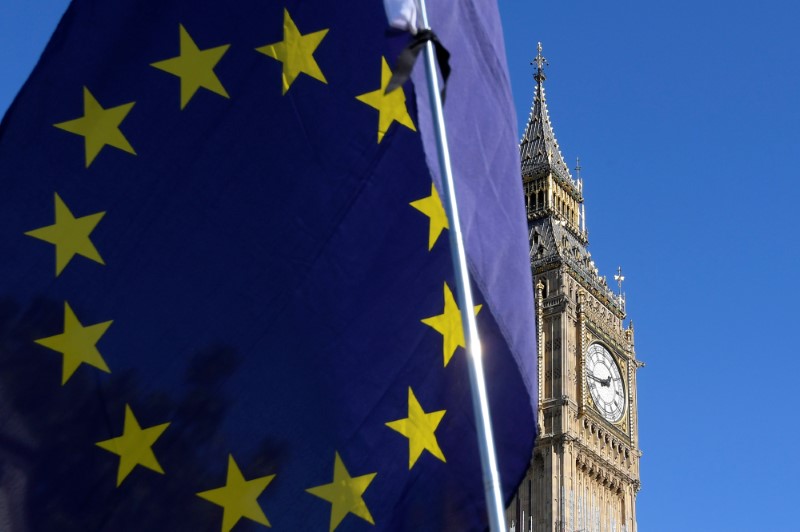(Bloomberg) -- U.K. Prime Minister Theresa May saw signs that her beleaguered Brexit deal might be winning support, just as Parliament began work to design a rival divorce plan.
On Tuesday morning, Jacob Rees-Mogg, chairman of the pro-Brexit caucus in May’s Conservative party, seemed to shift position, saying that while he didn’t like her deal, it was better than staying in the European Union.
How Parliament Will Try to Take Control of Brexit: Step-by-Step
“I’ve always thought that no deal is better than Mrs. May’s deal, but that Mrs. May’s deal is better than not leaving at all,” Rees-Mogg said in his regular podcast. “Her deal is in no way a good deal. Against that there are the threats of a long delay, and many people in Parliament who want to frustrate the result of the referendum. So we are in a very difficult political situation.”
This is the sort of break that May has been waiting for from pro-Brexit Conservatives, but the question is whether it will be enough, or too little, too late. Under the terms set out by the EU at a summit in Brussels, she has until Friday to get her deal through Parliament.
Forced to Choose
If May can’t get her deal through a vote in the House of Commons by Friday, the U.K. will be forced to choose between a potentially long delay to its departure and falling out of the EU without a deal on April 12.
A no-deal Brexit threatens the kind of economic crash that would hit the pound, disrupt goods supplies and provoke a major slump in house prices, according to official analysis. May’s divorce agreement has been rejected twice in parliamentary votes by huge majorities — but there is almost no support for leaving without a deal.
That suggests the most likely outcome would be a long extension to the negotiations, potentially lasting more than a year, during which time pro-Brexit campaigners increasingly fear their dream of leaving the EU could be brought to a halt.
She will speak at a private meeting of Conservative MPs on Wednesday evening, and try to persuade them to vote with her. Some have suggested that the price of their support will be her resignation.
Meet the Revolutionaries Upending Theresa May’s Brexit Plans
May’s team haven’t yet given up hope of being able to bring her deal back for a third vote in the House of Commons this week, although their chances of success also depend on convincing Northern Ireland’s Democratic Unionist Party, which props up the minority Conservative government, to come on board. That still seemed a distant prospect on Tuesday, even as Rees-Mogg and other staunch euro-skeptics in the Tory party showed a new openness to compromise.
Even if May can convince more of her colleagues to back her blueprint, it could all come too late, after she lost control of the parliamentary agenda in an almost unprecedented power-grab by rank-and-file politicians.
Those Conservatives who have given up on the prime minister have already started making their own plans, with allies in the opposition Labour Party. On Tuesday, Tory Nick Boles and Labour’s Hilary Benn set out the method by which Parliament will hold votes on different Brexit options on Wednesday.
Their plan also includes seizing control of the parliamentary timetable on Monday, when lawmakers could narrow the options further, or order the government to pursue a particular course of action.
Under their plan, members of Parliament will vote at 7 p.m. on the competing visions of Brexit, using paper ballots that will let them back as many options as they like. The result is likely to come after 8:30 p.m. London time.
Although the votes are a huge blow to May’s authority, they could still be helpful to her. So-called "indicative votes" were originally conceived within the cabinet, as a way of demonstrating to MPs that no alternative to May’s plan had the support of a majority either. Oliver Letwin, the architect of Wednesday’s takeover, has been clear that he thinks Parliament should pass May’s deal.
But for others, the votes are a chance to seize control and push a radically softer Brexit than May plans, or even stop it altogether. This is what’s driving Brexit supporters such as Rees-Mogg to consider dropping their opposition. Some take the view that having secured Britain’s departure from the EU, they can unpick her deal with a different leader.
“A new prime minister can negotiate a better and more distanced relationship with the EU after Brexit,” Tory MP Michael Fabricant wrote on Twitter. “This is a least worst option.”
The government hasn’t said whether Conservative MPs will be ordered to vote for or against particular motions. Although some in the cabinet favor free votes, to get a better sense of MPs’ preferences, none of them plan to resign to force the issue, according to one person familiar with their thinking. Three junior ministers quit this week to support indicative votes, but at the cabinet level, the view is that it’s more important to stay at the table, the person said.
(Updates with details of the votes, Conservative thinking from 10th paragraph.)
